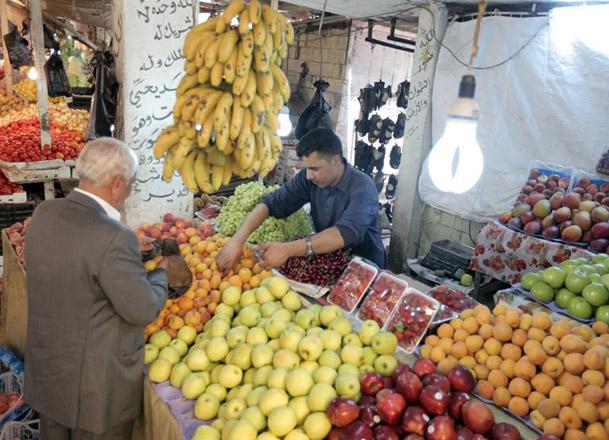You are here
33 trucks laden with fruits, vegetables, livestock destined for Qatar return to Jordan
By Hana Namrouqa - Jun 08,2017 - Last updated at Jun 08,2017

Prices of fruits and vegetables have already dropped in the local market, which is expected to be over supplied, according to the Jordan Exporters and Producers Society for Fruits and Vegetables (Photo by Osama Aqarbeh)
AMMAN — Thirty-three refrigerated trucks of fruits and vegetables destined for Qatar on Wednesday returned to Jordan, as Saudi Arabia closed its land borders with the Gulf state, according to officials.
The trucks were carrying over 600 tonnes of fruits and vegetables worth hundreds of thousands of dinars, agriculture sector representatives said.
“The trucks were not allowed to proceed to Qatar and have returned home,” Ministry of Agriculture Spokesperson Nimer Haddadin told The Jordan Times.
A total of 400-600 tonnes of fruits and vegetables and 700-800 head of sheep are exported to Qatar daily, Haddadin said.
Saudi Arabia and allies, including Egypt, the United Arab Emirates (UAE) and Bahrain, on Monday announced they were severing diplomatic relations and closing air, sea and land links with Qatar over claims it supports terrorist groups.
Zuhair Jweihan, president of the Jordan Exporters and Producers Society for Fruits and Vegetables, said that the closure of the Qatari market to the country’s fruits and vegetables is “yet another blow to the struggling agriculture sector”.
“A quarter of our exports of fruits and vegetables go to Qatar, which is a very promising market. This is a great loss and a big blow to the agriculture sector,” Jweihan told The Jordan Times.
Prices of fruits and vegetables have already dropped in the local market, which is expected to be over supplied, he noted.
“We are at the peak of production in the Mafraq, Azraq, Ramtha and Hallabat areas. We export great amounts of bell pepper, tomato, melon and all other kinds of fruits and vegetables to Qatar,” Jweihan highlighted.
The sector representative estimated the losses to be in the hundreds of thousands of dinars daily.
“We are no longer able to take a hit,” he said, referring to the ongoing closure of Jordan’s borders with Iraq and Syria.
The Karameh-Tureibil border crossing between Jordan and Iraq, the gateway for Jordanian produce to reach Iraqi and European markets, was closed in the summer of 2015.
Also in 2015, Jordan closed the Jaber border crossing with Syria for security reasons, while Ramtha, the other border crossing with the war-torn country, has been closed for nearly five years.
Meanwhile, the UAE, one of Jordan’s biggest importers of fruits and vegetables, banned the import of seven of Jordan’s vegetables as of mid-May over allegation of high pesticides residues.
















